欧洲版-第二页翻译
unit2englisharoundtheworld课文及翻译
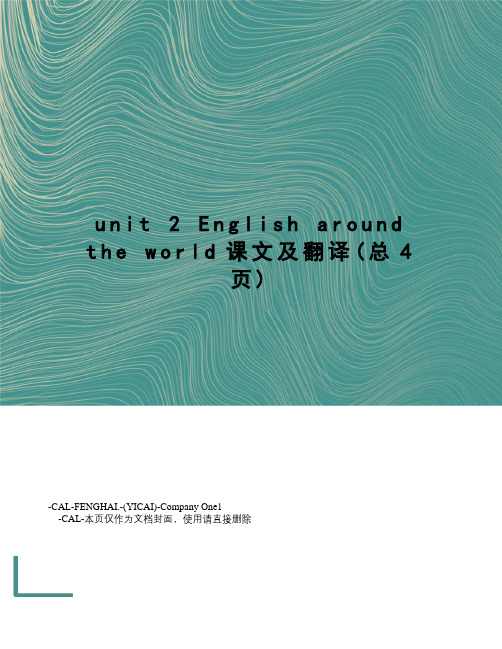
u n i t2E n g l i s h a r o u n dt h e w o r l d课文及翻译(总4页)-CAL-FENGHAI.-(YICAI)-Company One1-CAL-本页仅作为文档封面,使用请直接删除the Road to Modern EnglishAt the end of the 16th century, about five to seven million people spoke English. Nearly all of them lived in England. Later in the next century, people from England made voyages to conquer other parts of the world and because of that, English began to be spoken in many other countries. Today, more people speak English as their first, second or a foreign language than ever before.Native English speakers can understand each other even if they don’t speak the same kind of English. Look at this example:British Betty: Would you like to see my flatAmerican Amy: Yes. I’d like to come up to you apartment.So why has English changed over time Actually all languages change and develop when cultures meet and communicate with each other. At fist the English spoken in England between about AD 450 and 1150 was very different from the English spoken today. It was base more on German than the English we speak at present. Then gradually between about AD 800 and 1150, English became less like German because those who ruled England spoke first Danish and later French. These new settlers enriched the English language and especially its vocabulary. So by the 1600’s Shakespeare was able to make use of a wider vocabulary than ever before. In 1620 some British settlers moved to America. Later in the 18th century some British people were taken to Australia too. English began to be spoken in both countries.Finally by the 19th century the language was settled. At that time two big changes in English spelling happened: first Samuel Johnson wrote his dictionary and later Noah Webster wrote The American Dictionary of the English language. The latter gave a separate identity to American English spelling.English now is also spoken as a foreign or second language in South Asia. For example, India has a very large number of fluent English speakers because Britain ruled India from 1765 to 1947. During that time English became the language for government and education. English is also spoken in Singapore and Malaysia and countries in Africa such as South Africa. Today the number of2people learning English in China is increasing rapidly. In fact, China may have the largest number of English learners. Will Chinese English develop its own identity Only time will tell.通向现代英语之路16世纪末期大约有5百万至7百万人说英语,几乎所有这些人都生活在英国。
新概念英语第二册课文(中英文对照)
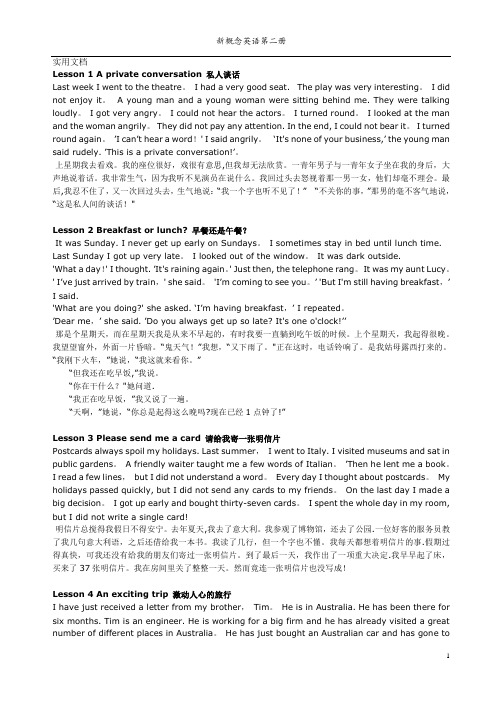
Lesson 1 A private conversation 私人谈话Last week I went to the theatre。
I had a very good seat. The play was very interesting。
I did not enjoy it。
A young man and a young woman were sitting behind me. They were talking loudly。
I got very angry。
I could not hear the actors。
I turned round。
I looked at the man and the woman angrily。
They did not pay any attention. In the end, I could not bear it。
I turned round again。
’I can’t hear a word!' I said angrily。
‘It's none of your business,’ the young man said rudely. ’This is a private conversation!’。
上星期我去看戏。
我的座位很好,戏很有意思,但我却无法欣赏。
一青年男子与一青年女子坐在我的身后,大声地说着话。
我非常生气,因为我听不见演员在说什么。
我回过头去怒视着那一男一女,他们却毫不理会。
最后,我忍不住了,又一次回过头去,生气地说:“我一个字也听不见了!” “不关你的事,”那男的毫不客气地说,“这是私人间的谈话!"Lesson 2 Breakfast or lunch? 早餐还是午餐?It was Sunday. I never get up early on Sundays。
I sometimes stay in bed until lunch time. Last Sunday I got up very late。
DIN EN10250-3
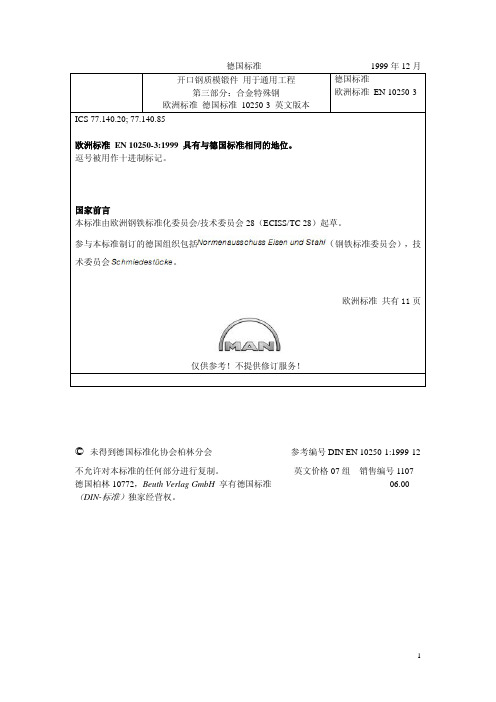
德国标准 1999年12月(术委员会© 未得到德国标准化协会柏林分会参考编号DIN EN 10250-1:1999-12不允许对本标准的任何部分进行复制。
英文价格07组销售编号1107 德国柏林10772,Beuth Verlag GmbH 享有德国标准 06.00 (DIN-标准)独家经营权。
欧洲标准 EN 10250-31999年10月ICS 77.140.20;77.140.85英文版本用于通用工程的开口钢质模锻件第三部分:合金特殊钢本标准于1999年9月9日获得了欧洲标准化委员会的批准。
欧洲标准化委员会的成员必须遵守欧洲标准化委员会/欧洲电工标准化委员会的内部规定。
欧洲标准化委员会/欧洲电工标准化委员会规定了生成本欧洲标准的条件,并规定了没有任何变化的国家标准的状态。
与这些国家标准相关的最新列表及参考书目可通过向重要秘书处或任何一个欧洲标准化委员会成员申请获得。
本欧洲标准存在三种官方版本(英文、法文、德文)。
由欧洲标准化委员会成员组织翻译成其自己语言,并告知了秘书处的任何其他语言版本的标准,与本官方版本具有同等地位。
欧洲标准化委员会成员是以下国家标准的主体,包括奥地利、比利时、捷克共和国、丹麦、芬兰、法国、德国、希腊、冰岛、爱尔兰、意大利、卢森堡、荷兰、挪威、葡萄牙、西班牙、瑞典、瑞士以及英国。
CEN欧洲标准化委员会中央秘书处:rue de Stassart 36, B-1050 布鲁塞尔© 1999.欧洲标准化委员会-全世界参考编号EN 10250-3:1999E欧洲标准化委员会的国家成员保留任何形式及方式的开发权第二页EN 10250-3:1999目录页码前言 21 范围 32 参考标准 33 化学成分 34 热处理 45 机械性能 4附录A (信息功能)热处理 11前言本欧洲标准由欧洲钢铁标准化委员会(ECISS/TC28)“钢锻件”技术委员会起草。
其秘书处属于英国标准协会(BSI)。
DIN EN10250-2中文版

德国标准 1999年12月(术委员会© 未得到DIN 德国标准化协会柏林参考编号DIN EN 10250-2:1999-12分会的许可,不允许对本标准的任何部分进行复制。
英文价格8组销售编号1108 德国柏林10772,Beuth Verlag GmbH 享有德国标准 06.00 (DIN-标准)独家经营权。
欧洲标准 EN 10250-21999年10月ICS 77.140.45;ICS 77.140.85英文版本用于通用工程的开口钢质模锻件第二部分:非合金质量及特种钢本标准于1999年9月9日获得了欧洲标准化委员会的批准。
欧洲标准化委员会的成员必须遵守欧洲标准化委员会/欧洲电工标准化委员会的内部规定。
欧洲标准化委员会/欧洲电工标准化委员会规定了生成本欧洲标准的条件,并规定了没有任何变化的国家标准的状态。
与这些国家标准相关的最新列表及参考书目可通过向重要秘书处或任何一个欧洲标准化委员会成员申请获得。
本欧洲标准存在三种官方版本(英文、法文、德文)。
由欧洲标准化委员会成员组织翻译成其自己语言,并告知了秘书处的任何其他语言版本的标准,与本官方版本具有同等地位。
欧洲标准化委员会成员是以下国家标准的主体,包括奥地利、比利时、捷克共和国、丹麦、芬兰、法国、德国、希腊、冰岛、爱尔兰、意大利、卢森堡、荷兰、挪威、葡萄牙、西班牙、瑞典、瑞士以及英国。
CEN欧洲标准化委员会中央秘书处:rue de Stassart 36, B-1050 布鲁塞尔© 1999.欧洲标准化委员会-全世界参考编号EN 10250-2:1999E欧洲标准化委员会的国家成员保留任何形式及方式的开发权第二页EN 10250-2:1999目录页码前言 21 范围 32 参考标准 33 化学成分 34 热处理 45 机械性能 5附录A (信息功能)热处理 8前言本欧洲标准由欧洲钢铁标准化委员会(ECISS/TC28)“钢锻件”技术委员会起草。
DIN EN10250-2中文版

德国标准 1999年12月(术委员会© 未得到DIN 德国标准化协会柏林参考编号DIN EN 10250-2:1999-12分会的许可,不允许对本标准的任何部分进行复制。
英文价格8组销售编号1108 德国柏林10772,Beuth Verlag GmbH 享有德国标准 06.00 (DIN-标准)独家经营权。
欧洲标准 EN 10250-21999年10月ICS 77.140.45;ICS 77.140.85英文版本用于通用工程的开口钢质模锻件第二部分:非合金质量及特种钢本标准于1999年9月9日获得了欧洲标准化委员会的批准。
欧洲标准化委员会的成员必须遵守欧洲标准化委员会/欧洲电工标准化委员会的内部规定。
欧洲标准化委员会/欧洲电工标准化委员会规定了生成本欧洲标准的条件,并规定了没有任何变化的国家标准的状态。
与这些国家标准相关的最新列表及参考书目可通过向重要秘书处或任何一个欧洲标准化委员会成员申请获得。
本欧洲标准存在三种官方版本(英文、法文、德文)。
由欧洲标准化委员会成员组织翻译成其自己语言,并告知了秘书处的任何其他语言版本的标准,与本官方版本具有同等地位。
欧洲标准化委员会成员是以下国家标准的主体,包括奥地利、比利时、捷克共和国、丹麦、芬兰、法国、德国、希腊、冰岛、爱尔兰、意大利、卢森堡、荷兰、挪威、葡萄牙、西班牙、瑞典、瑞士以及英国。
CEN欧洲标准化委员会中央秘书处:rue de Stassart 36, B-1050 布鲁塞尔© 1999.欧洲标准化委员会-全世界参考编号EN 10250-2:1999E欧洲标准化委员会的国家成员保留任何形式及方式的开发权第二页EN 10250-2:1999目录页码前言 21 范围 32 参考标准 33 化学成分 34 热处理 45 机械性能 5附录A (信息功能)热处理 8前言本欧洲标准由欧洲钢铁标准化委员会(ECISS/TC28)“钢锻件”技术委员会起草。
新概念英语第二册中英文对照课文免费阅读
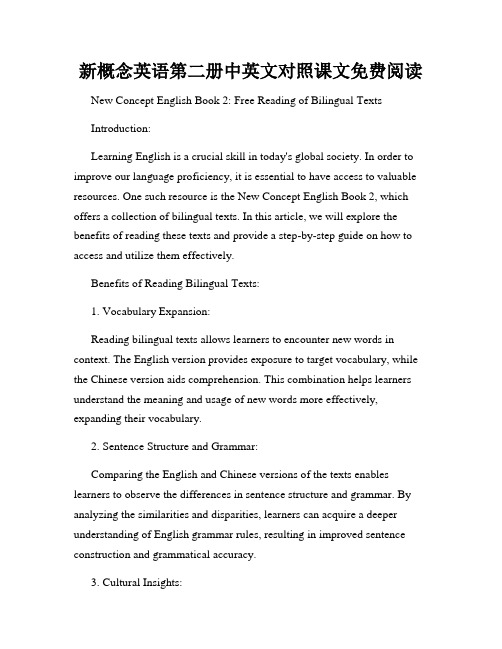
新概念英语第二册中英文对照课文免费阅读New Concept English Book 2: Free Reading of Bilingual TextsIntroduction:Learning English is a crucial skill in today's global society. In order to improve our language proficiency, it is essential to have access to valuable resources. One such resource is the New Concept English Book 2, which offers a collection of bilingual texts. In this article, we will explore the benefits of reading these texts and provide a step-by-step guide on how to access and utilize them effectively.Benefits of Reading Bilingual Texts:1. Vocabulary Expansion:Reading bilingual texts allows learners to encounter new words in context. The English version provides exposure to target vocabulary, while the Chinese version aids comprehension. This combination helps learners understand the meaning and usage of new words more effectively, expanding their vocabulary.2. Sentence Structure and Grammar:Comparing the English and Chinese versions of the texts enables learners to observe the differences in sentence structure and grammar. By analyzing the similarities and disparities, learners can acquire a deeper understanding of English grammar rules, resulting in improved sentence construction and grammatical accuracy.3. Cultural Insights:Bilingual texts provide a unique opportunity to explore different cultures. Through reading the English and Chinese versions side by side, learners can gain insights into both English-speaking countries and Chinese culture. This exposure enhances intercultural understanding and promotes a global perspective among learners.Accessing and Utilizing the Bilingual Texts:1. Online Platforms:Various online platforms provide free access to the New Concept English Book 2 and its bilingual texts. Websites such as ABC英语学习网and 爱词霸 offer downloadable PDF versions of the book, allowing learners to read the texts offline at their convenience.2. Reading Strategies:To maximize the benefits of reading the bilingual texts, learners should adopt certain strategies. Firstly, it is advisable to read the English version before referring to the Chinese one. This helps learners engage with the target language and develop their comprehension skills. Afterward, learners can check their understanding and clarify any uncertainties by referring to the Chinese text.3. Annotation and Note-Taking:Actively engaging with the texts is crucial for effective learning. Learners are encouraged to annotate the texts, noting down unfamiliar words, sentence structures, and cultural references. These annotations serve as valuable references for future review and reinforce the learning process.4. Practice and Repetition:Repetition is key to language acquisition. Learners should revisit the bilingual texts regularly, gradually reducing their reliance on the Chinese version and focusing more on the English text. This practice cultivates reading fluency and enhances comprehension. Additionally, learners can improve their pronunciation and oral skills by reading the English version aloud.Conclusion:The availability of bilingual texts in the New Concept English Book 2 provides learners with a valuable resource to enhance their English proficiency. By strategically utilizing these texts, learners can expand their vocabulary, improve sentence structure and grammar, and gain cultural insights. Accessing the texts online and adopting effective reading strategies, annotation, and regular practice will undoubtedly contribute to a successful language learning journey. Enjoy the experience of immersing yourself in the world of bilingual texts and embrace the endless possibilities that come with mastering the English language.。
六下英语m4u2课文翻译
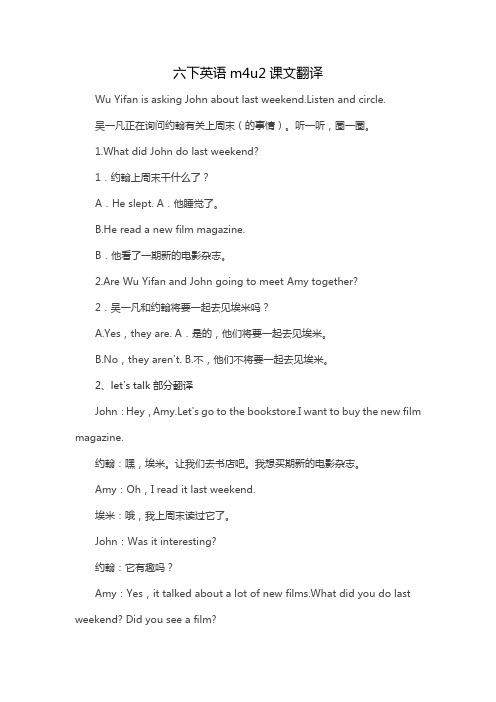
六下英语m4u2课文翻译Wu Yifan is asking John about last weekend.Listen and circle.吴一凡正在询问约翰有关上周末(的事情)。
听一听,圈一圈。
1.What did John do last weekend?1.约翰上周末干什么了?A.He slept. A.他睡觉了。
B.He read a new film magazine.B.他看了一期新的电影杂志。
2.Are Wu Yifan and John going to meet Amy together?2.吴一凡和约翰将要一起去见埃米吗?A.Yes,they are. A.是的,他们将要一起去见埃米。
B.No,they aren't. B.不,他们不将要一起去见埃米。
2、let's talk部分翻译John:Hey,Amy.Let's go to the bookstore.I want to buy the new film magazine.约翰:嘿,埃米。
让我们去书店吧。
我想买期新的电影杂志。
Amy:Oh,I read it last weekend.埃米:哦,我上周末读过它了。
John:Was it interesting?约翰:它有趣吗?Amy:Yes,it talked about a lot of new films.What did you do last weekend? Did you see a film?埃米:是的,它讲了许多关于新电影(的事情)。
你上周末干什么了?你看电影了吗?John:No,I had a cold.I stayed at home all weekend and slept.约翰:没有,我感冒了。
我整个周末都待在家里睡觉。
Amy:Oh,I'm sorry.I'm happy you feel better now.埃米:哦,我很难过。
外研版九年级上册英语Module6Unit2部分课文翻译
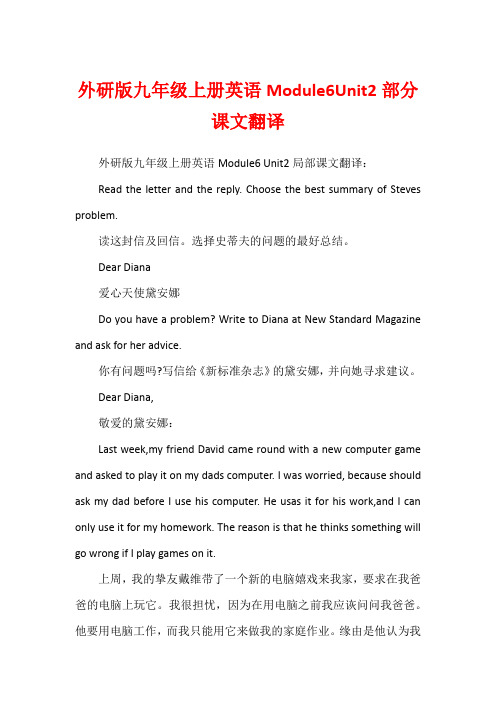
外研版九年级上册英语Module6Unit2部分课文翻译外研版九年级上册英语Module6 Unit2局部课文翻译:Read the letter and the reply. Choose the best summary of Steves problem.读这封信及回信。
选择史蒂夫的问题的最好总结。
Dear Diana爱心天使黛安娜Do you have a problem? Write to Diana at New Standard Magazine and ask for her advice.你有问题吗?写信给《新标准杂志》的黛安娜,并向她寻求建议。
Dear Diana,敬爱的黛安娜:Last week,my friend David came round with a new computer game and asked to play it on my dads computer. I was worried, because should ask my dad before I use his computer. He usas it for his work,and I can only use it for my homework. The reason is that he thinks something will go wrong if I play games on it.上周,我的挚友戴维带了一个新的电脑嬉戏来我家,要求在我爸爸的电脑上玩它。
我很担忧,因为在用电脑之前我应诙问问我爸爸。
他要用电脑工作,而我只能用它来做我的家庭作业。
缘由是他认为我要是在电脑上玩嬉戏的话,电脑就会出毛病。
Well,while my dad was out,we decided to try out Davids game. We copied it to the computer,and after we finished playing, we took it off the computer. However, when I started the computer again to check if everything was OK,some of my dads documents were missing. Then,when my dad used the computer last night,he was really angry. He could no longer find the documents anywhere! They were very important.噢,当时我爸爸不在家,我们确定试一下戴维的嬉戏。
